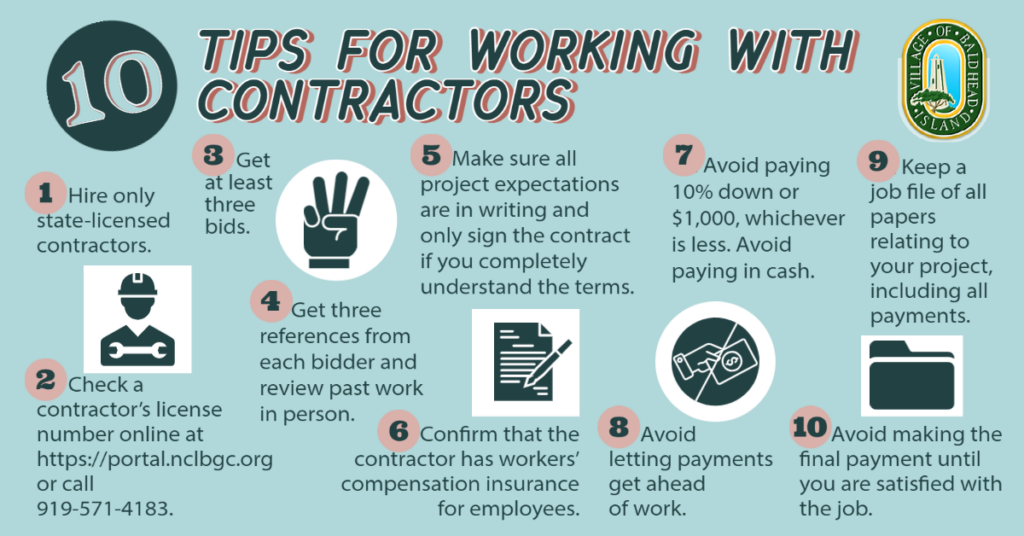The Village wants to remind property owners to make sure that they are hiring licensed
contractors. This is for safety and liability. Our Development Services Director, who
performs building inspections cited a recent instance where an unlicensed person was
hired to do electrical work. Live wires were left exposed near duct work which could
have resulted in injury of an HVAC tech and/or a fire.
In the State of North Carolina, a general contractor must be licensed if the contract is
valued at $30,000 or higher. North Carolina law also requires all electrical, plumbing,
and heating and air contractors and subcontractors to be licensed.
N.C. licensed contractors are professionals who have passed technical exams and have
proven that they have the financial means to support their business. Should you
experience a substantial problem with a licensed contractor, the State Licensing Board
for that trade will investigate the complaint and if found valid, take appropriate action
against the contractor.
Below are some tips for working with contractors to avoid any issues that could occur
with any project (Source: NC Licensing Board for General Contractors website).
- Plan your project
Plan out in detail what you want done and who you will need to complete it. No two
projects are the same, and some may require a specially licensed contractor.
Contact your local permitting office (sboyett@villagebhi.org / 910-457-9700 ext.
1004 to see if permits are required to assure code compliance. Most licensed
contractors know when permits are required. - Get several estimates
When comparing estimates from different contractors, don’t just compare the
bottom-line cost. Look at the cost, quantity, and quality of materials in each estimate.
Be sure the estimate includes the total price, the materials to be used, a timetable
for payments and the expected timeline for completion of the work. - Verify the contractor’s license
You can check for proof that the contractor you may be working with is licensed by going to the NC Licensing Board for General Contractors website here: https://portal.nclbgc.org/Public/Search. You can also call 919-571-4183. The required specialties licenses can be checked online or by phone for electricians https://www.ncbeec.org/ (919-733-9042), for plumbers, HVAC techs, and fire sprinkler installers https://nclicensing.org/ (919-875-3612). - Check at least 3 references
Ask your contractor for written references. Contact each reference and ask if they
were satisfied with the contractor’s work and if the contractor kept to the schedule
and contract terms. - Require a written contract
The contract should be a detailed description of the work to be done, the material to
be used and the equipment to be installed. Be sure there is a schedule of payments
and a timeline for when the work will be completed. Be sure you understand the
contract before you sign it. Any changes that occur should be noted in writing. - Don’t make a large down payment
The down payment you pay in order for work to begin should be minimal. Beware of
contractors asking for a large down payment so that they can purchase the materials
to begin your project. - Make payments as work is completed
Set up a payment schedule that follows the work as it is being completed. Never pay
for something that has not been completed. Do not pay for anything in cash. - Monitor the job in progress
Check in regularly on the progress of the work. Permits should be displayed by the
contractor while the work is being done. - Don’t make the final payment until the job is complete
Before making the final payment make sure that you are satisfied with the completed
work. Verify that all liens have been released. - Keep all paperwork related to the job
Be sure to keep a record of all documents that pertain to your project. This includes
the contract, any written changes, all bills and invoices, receipts of payments and all
correspondence with your contractor. You should also include photos of the job in progress.

PDF version of this article HERE.
